Iterable<T> collection = ...
for (T e: collection) {
...
}Core Java. Lecture #7
Collections, lambdas, method references
@inponomarev
Ivan Ponomarev, Synthesized.io/MIPT
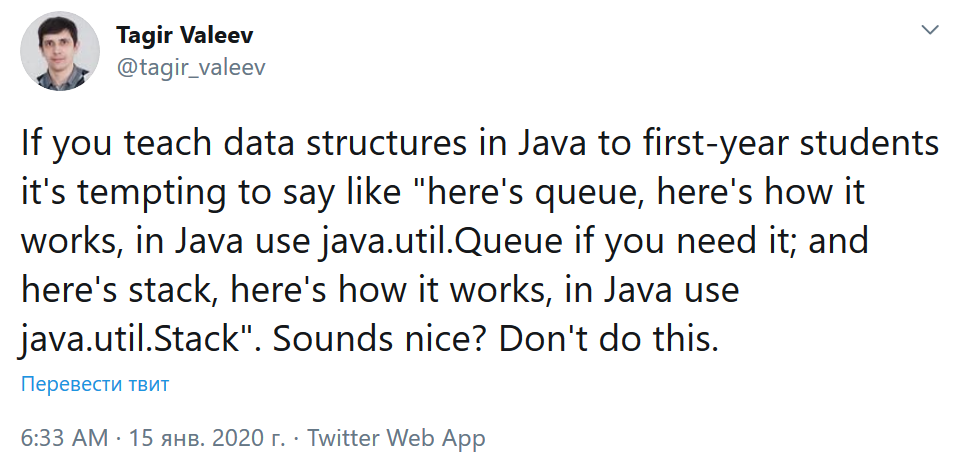
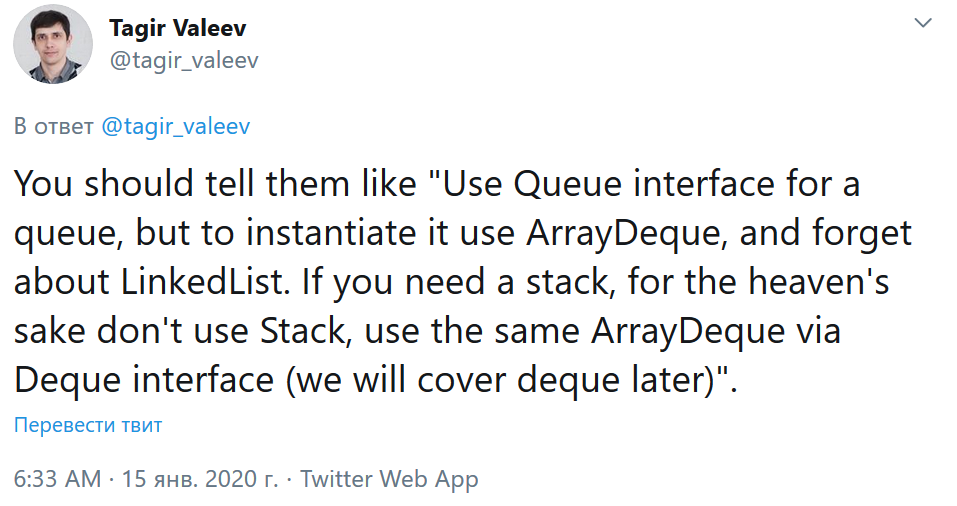
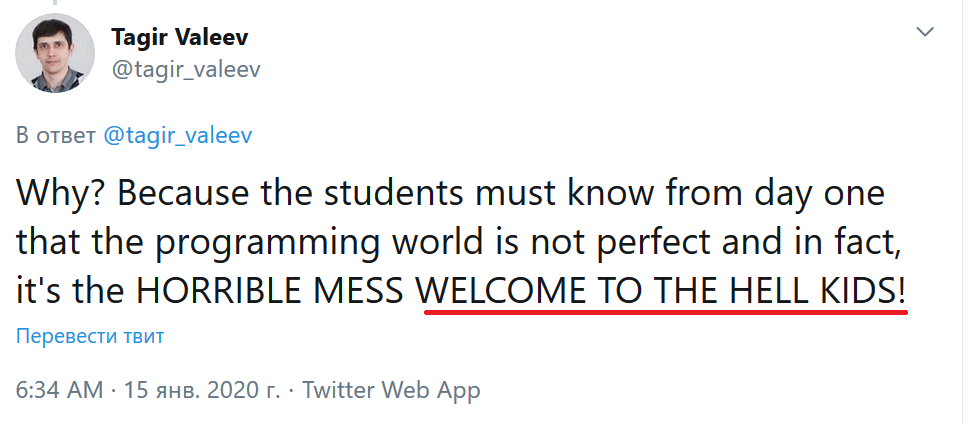
Collections: Separation of interfaces and implementations

Collection Interfaces: Descendants of Collection
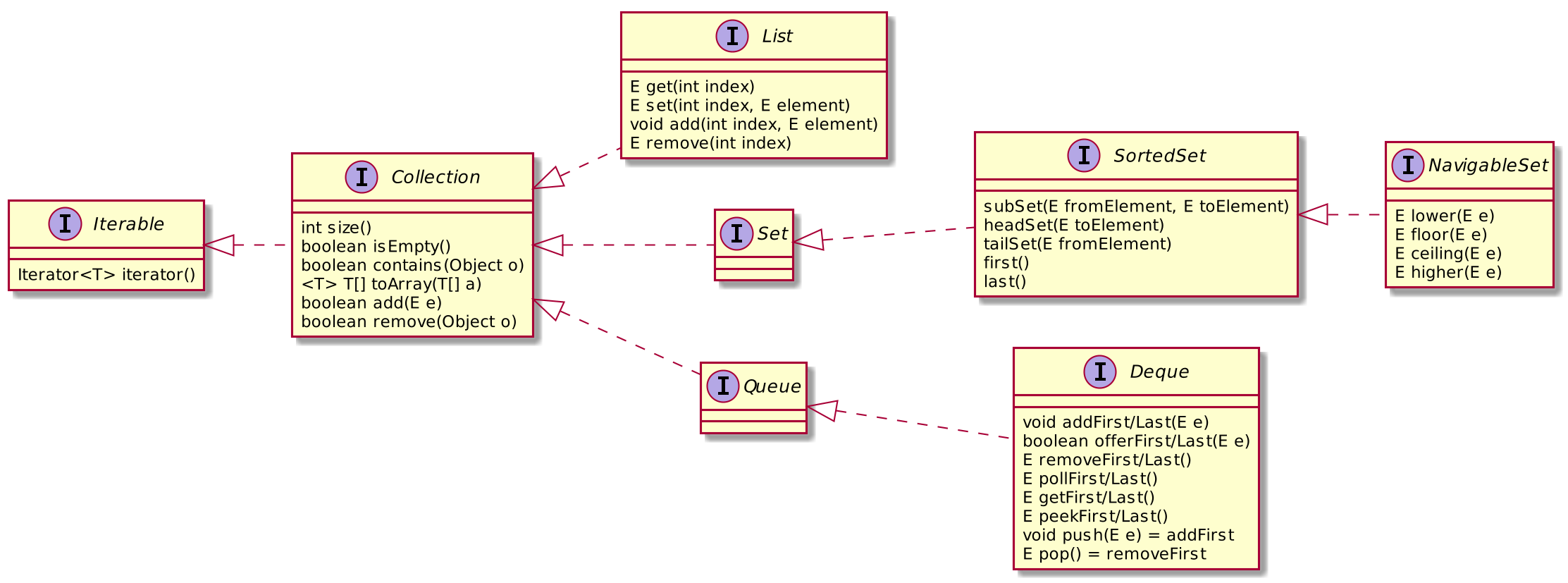
Iterable: an interface that can participate in for loop

|
ListIterator: extension for List

Collection Interfaces: Descendants of Map

Comparable and Comparator
public interface Comparable<T>{
/**
* @param o the object to be compared.
* @return a negative integer, zero, or a positive integer as this object
* is less than, equal to, or greater than the specified object.
*/
int compareTo(T o);
}
/*Applies if objects being compared
do not implement Comparable*/
public interface Comparator<T> {
int compare(T o1, T o2);
}Intermediate Conclusions
Use interfaces for variable types and method arguments. Don’t be tied to specific implementations.
In addition to the possibility of substitution of implementations, there are surrogate collections, for example, the following important special cases:
//IMMUTABLE
//Empty //From a single element
Collections.emptyList(); Collections.singletonList(o);
Collections.emptySet(); Collections.singleton(o);
Collections.emptyMap(); Collections.singletonMap(k,v);Immutable collections of specified elements
//Of specified elements
List.of(a, b, c...);
Set.of(a, b, c...);
Map.of(k1, v1, k2, v2...);But how did they do it for map?
Surrogate collections: (partial) protection when an object is published
Collections.unmodifiableList(List<? extends T> l);
Collections.unmodifiableSet(Set<? extends T> s);
Collections.unmodifiableMap(Map<? extends K,
? extends V> s);
...In the Collections class (as well as in the Arrays class) there is a lot of useful stuff!
ArrayList the Great
List<String> list = new ArrayList<>();
list.add("foo"); list.add("bar"); list.add("baz");
(Vizualization is made with Lightweight Java Visualizer.)
Algorithmic properties of ArrayList
get(int index)is O(1) ← main benefit ofArrayList<E>add(E element)is O(1) amortized, but O(n) worst-case since the array must be resized and copiedadd(int index, E element)is O(n) (with n/2 steps on average)remove(int index)is O(n) (with n/2 steps on average)Iterator.remove()is O(n) (with n/2 steps on average)ListIterator.add(E element)is O(n) (with n/2 steps on average)
LinkedList
List<String> list = new LinkedList<>();
list.add("foo"); list.add("bar"); list.add("baz");
Algorithmic properties of LinkedList
Implements
ListandDequeget(int index)is O(n) (with n/4 steps on average)add(E element)is O(1)add(int index, E element)is O(n) (with n/4 steps on average), but O(1) whenindex = 0← main benefit ofLinkedList<E>remove(int index)is O(n) (with n/4 steps on average)Iterator.remove()is O(1) ← main benefit ofLinkedList<E>ListIterator.add(E element)is O(1) This is one of the main benefits ofLinkedList<E>
Does anyone use LinkedList?

What if you still need Deque?
ArrayDequeCircular array
Faster than
LinkedList.

PriorityQueue
Queuing by priority utilizing
ComparableorComparator.Balanced binary heap: "the two children of
queue[n]arequeue[2*n+1]andqueue[2*n+2]"
PriorityQueue<String> q = new PriorityQueue<>();
q.add("foo"); q.add("bar"); q.add("baz");
Theoretical asymptotics does not fully describe the suitability of a particular data structure: a number of circumstances should be taken into account, such as
particular "sweet spot" cases and their frequency,
cache usage efficiency,
amount of "garbage" produced
etc.
ArrayListandArrayDequeare the preferred choice as implementation ofListandDequein most of the cases.
HashMap the Great
Map<String, Integer> map = new HashMap<>();
map.put("foo", 1); map.put("bar", 2); map.put("baz", 3);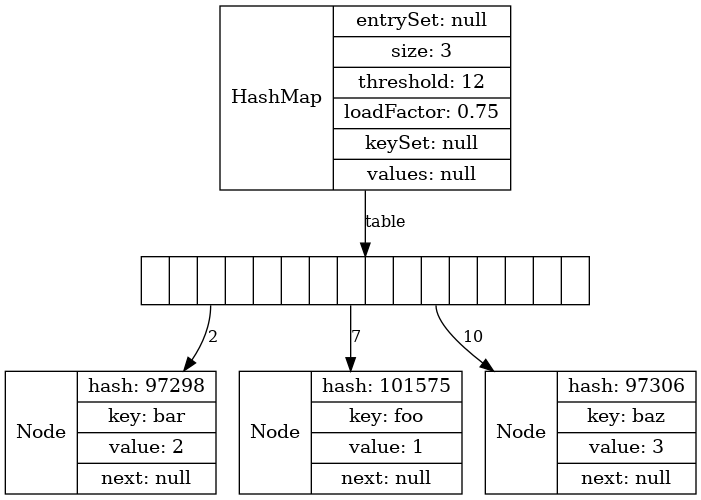
Hash collisions
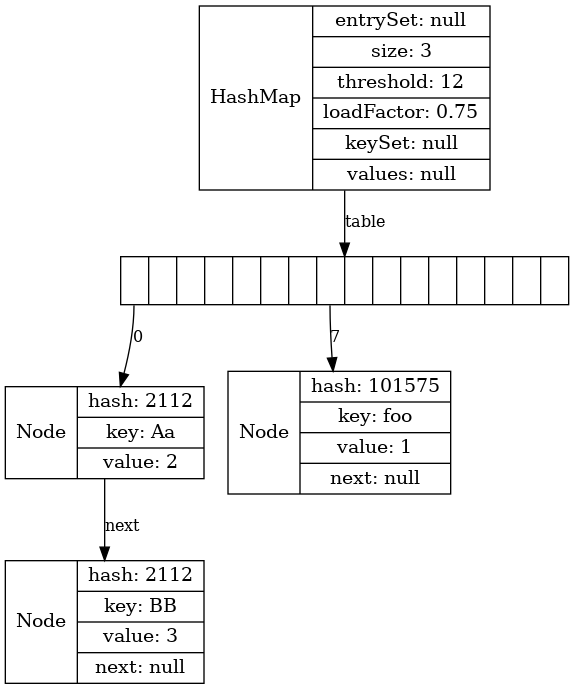 |
|
LinkedHashMap
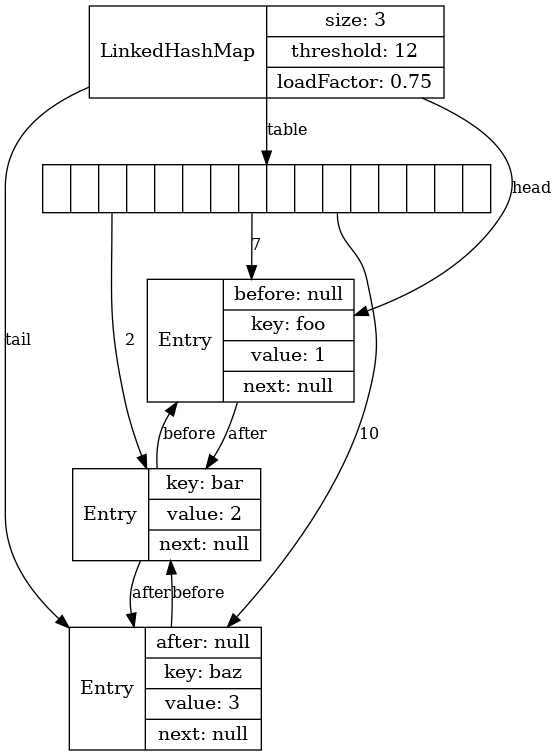 |
|
More variations on the hash table theme
IdentityHashMap— keys are compared by==rather thanequals().WeakHashMap— values can be garbage collected if not used elsewhere.
TreeMap
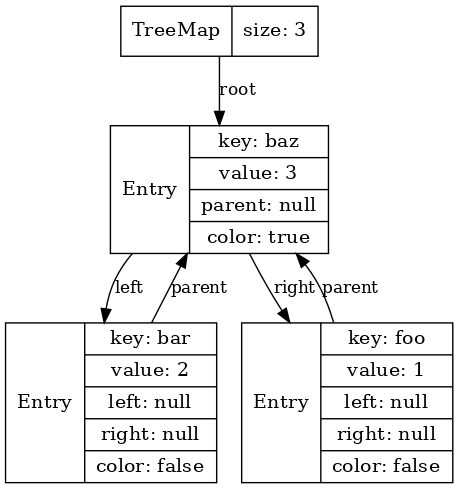 |
|
Sets
Collections in which an object can only be present once.
Implemented on the basis of the corresponding Maps:
HashSet,LinkedHashSet,TreeSet.
private transient HashMap<E,Object> map;
// Dummy value to associate with an Object in the backing Map
private static final Object PRESENT = new Object();
public boolean add(E e) {
return map.put(e, PRESENT)==null;
}Bitmap-based sets
EnumSet— uses a singlelongif there is less than 64 enum values. Use it for enums!BitSet— array of `long`s.
Algorithms: sorting and shuffling
| |
Algorithms: binary search
| |
Also already implemented
min/max search
copying
list reversing
union and difference
… — search and you will find!
Callbacks: before lambdas
public interface ActionListener {
void actionPerformed(ActionEvent event);
}
// ----using----
String text = ...
new Timer(1000, new ActionListener(){
@Override
public void actionPerformed(ActionEvent e) {
... //'text' var is available here
}
});Callbacks: Comparator
String[] friends = {"Peter", "Paul", "Mary"};
Arrays.sort(friends,
new Comparator<String>() {
@Override
public int compare(String o1, String o2) {
return o1.length() - o2.length();
}
});Predicate
File[] hiddenFiles = new File(".").listFiles(
new FileFilter() {
public boolean accept(File file) {
return file.isHidden();
}
}
);Welcome lambda expressions!
//single-line
(String first, String second) ->
first.length() - second.length()
//multi-line with int return
(String first, String second) -> {
if (first.length() < second.length()) return -1;
else if (first.length() > second.length()) return 1;
else return 0;
}
//no-arg, void return
() -> System.out.println("Hello!");Which of these are valid lambda expressions?
() → {}() → "Raoul"() → {return "Mario";}(Integer i) → return "Alan" + i(String s) → {"Iron Man"}
Answer: 1-3. If lambda contains curly braces, be sure to use return. No curly braces — no return needed!
What can lambdas be assigned to?
A functional interface is one that has no more than one abstract method (it is clear what to run).
Can be tagged with
@FunctionalInterface, although it is not required.If the interface method matches the parameters and the return value of the lambda - then it can be assigned.
//You don't need to specify the types of lambda arguments: type inference!
ActionListener = e -> {...}
Comparator<String> c = (s1, s2) -> s1.length() - s2.length();Void-compatibility
Both options are compiled:
final List<String> list = ...
//Predicate.test returns boolean
Predicate<String> p = s -> list.add(s);
//Consumer.accept returns void!
Consumer<String> c = s -> list.add(s);Object is not a functional interface!
//will not compile
Object o = ()->{};
//Compiled!
Runnable r = ()->{};
//Also compiled
Object o = (Runnable) ()->{};As a result we have
Anonymous Class | Lambda |
| |
| |
Closures
void repeatMessage(String text, int delay) {
ActionListener listener = event -> {
//text variable is accessible inside the lambda!
System.out.println(text);
}
new Timer(delay, listener).start();
}Lambda "ingredients":
Code
Parameters
Captured variables that must be final or effectively final
Effectively final only
int start = ...
for (int i = 0; i < count; i++) {
ActionListener linstener = event -> {
start--; //ERROR: Can't mutate captured value
//ERROR: Cannot refer to changing i
System.out.println(i);
}
}(Effectively final variables are those that are either already final, or, if you put final for them, the code will still compile)
Method references: even shorter, even more efficient
| |
| |
| |
Three ways to define a Method reference
|
|
|
|
|
|
Constructor/Array Constructor Reference
|
|
|
|
IDE will help, but there is a difference!
obj = null;
//NPE on lambda invocation only!!
//obj must be effectively final!
doSmth(x -> obj.method(x));
//NPE here and now
//obj must not be effectively final
doSmth(obj::method)Methods specially created to be method references
//Come on, is it hard to check for null??
Objects.isNull(Object obj)...
Objects.nonNull(Object ob)...
list.removeIf(Objects::isNull);
stream.filter(Objects::nonNull)...Ready-made functional types
| Functional Interface | Parameter Types | Return Type | Abstract Method Name | Default Methods |
|---|---|---|---|---|
Runnable | none | void | run | |
Supplier<T> | none | T | get | |
Consumer<T> | T | void | accept | andThen |
BiConsumer<T, U> | T, U | void | accept | andThen |
Combination of consumers
Consumer<String> foo = ...
List<String> list = ...
//Compound consumer sending
//object first in the first, then in the second
Consumer<String> bar = foo.andThen(list::add);Functions
| Functional Interface | Parameter Types | Return Type | Abstract Method Name | Default Methods |
|---|---|---|---|---|
Function<T, R> | T | R | apply | compose, andThen, identity |
BiFunction<T, U, R> | T, U | R | apply | andThen |
Composition of functions and identity
|
|
|
|
|
|
Why does BiFunction have no compose, only andThen?
Operators
| Functional Interface | Parameter Types | Return Type | Abstract Method Name | Default Methods |
|---|---|---|---|---|
UnaryOperator<T> | T | T | apply | compose, andThen, identity |
BinaryOperator<T> | T, T | T | apply | andThen, maxBy, minBy |
Composition of operators
UnaryOperator<T> extends Function<T,T>, that’s whycompose,andThenandidentitywork the same way.BinaryOperator<T> extends BiFunction<T,T,T>, that’s whyandThenworks the same wayThe static
minByandmaxBymethods generate themin(x,y)andmax(x,y)operators from the comparator.
Predicates
| Functional Interface | Parameter Types | Return Type | Abstract Method Name | Default Methods |
|---|---|---|---|---|
Predicate<T> | T | boolean | test | and, or, negate, isEqual |
BiPredicate<T, U> | T, U | boolean | test | and, or, negate |
Predicate composition
Predicate<T> a = ...
Predicate<T> b = ...
a.and(b).negate(); // ! (a(x) & b(x))
//Double predicate (x,y)-> Objects.equals(x, y)
Objects::equals
//Single predicate y -> Objects.equals(x, y)
Predicate.isEqual(x)Functional interfaces for primitive types
p, q is int, long, double; P, Q is Int, Long, Double
| Functional Interface | Parameter Types | Return Type | Abstract Method Name |
|---|---|---|---|
BooleanSupplier | none | boolean | getAsBoolean |
PSupplier | none | p | getAsP |
PConsumer | p | void | accept |
ObjPConsumer<T> | T, p | void | accept |
PFunction<T> | p | T | apply |
PToQFunction | p | q | applyAsQ |
ToPFunction<T> | T | p | applyAsP |
ToPBiFunction<T, U> | T, U | p | applyAsP |
Functional interfaces for primitive types (continued)
| Functional Interface | Parameter Types | Return Type | Abstract Method Name |
|---|---|---|---|
PUnaryOperator | p | p | applyAsP |
PBinaryOperator | p, p | p | applyAsP |
PPredicate | p | boolean | test |
Default Map interface methods
Work atomically in ConcurrentHashMap!
V computeIfAbsent(K key,
Function<? super K, ? extends V> mappingFunction)
V computeIfPresent(K key,
BiFunction<? super K, ? super V, ? extends V> remappingFunction)
V compute(K key,
BiFunction<? super K, ? super V, ? extends V> remappingFunction)
V merge(K key, V value,
BiFunction<? super V, ? super V, ? extends V> remappingFunction)Comparators
@AllArgsConstructor
public class Person {
@Getter
private final String firstName;
@Getter
private final String lastName;
}
List<Person> people = new ArrayList<>();Sort by last name
| |
Sort by last name, then by first name
//DON'T WRITE THIS HORRIBLE MESS
Collections.sort(people,
(p1, p2) -> {
int result = p1.getFirstName().compareTo(p2.getFirstName());
if (result == 0) {
result = p2.getLastName().compareTo(p2.getLastName());
}
return result;
}
);Correct:
Collections.sort(people,
Comparator
.comparing(Person::getLastName)
.thenComparing(Person::getFirstName));
);Also:
Comparator.comparing(keyExtractor, keyComparator)
Comparator.comparingInt/Double(...)
Comparator.reversed()
Comparator.nullsFirst/nullsLast(Comparator c)